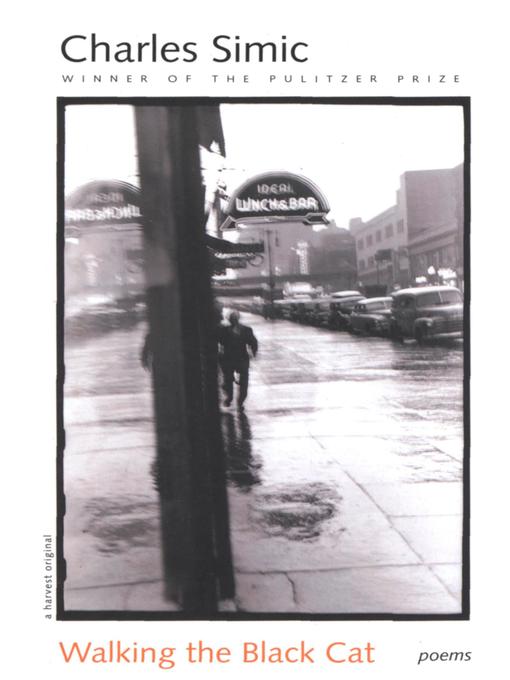
Walking the Black Cat
کتاب های مرتبط
- اطلاعات
- نقد و بررسی
- دیدگاه کاربران
نقد و بررسی

Starred review from October 14, 1996
Simic's short, taut lines carve dark-edged images reminiscent of old folk tales. In this new collection, his 13th (The World Doesn't End earned him the Pulitzer Prize for Poetry in 1990), he focuses on such folklore elements as chance, luck, faith and illusion at work in a quotidian world of cookouts, family life and memory. Juxtaposing disparate images, Simic jars his readers into a state of disorientation, priming them for a world where one must approach mirrors "sideways/ In rooms webbed in shadow," where "Destiny marks you early in the day/ With a knowing finger," and where a tree is "spooked/ By its own evening whispers/...Making a noise full of deep/ Misgivings,/ Like bloody razor blades/ Being shuffled." There the lucky and the nimble survive: "Death's an early riser./ You've got to be real quick/ To slip under his arm." Handling his many images like a confident juggler or a magician, in "My Magician" Simic himself is the magician's dummy: "Through a row of wooden teeth/ We spoke of God the Father./ Then we vanished in a pack of cards." Simic's poetry depicts a tricky, dangerous and unstable existence where the black cat--symbol of bad luck--is a constant, even loved, companion. "It's horror movie time,/ Says the Emperor" in "The Emperor," but with these poems Simic tames that horror some and walks it on a leash.

November 1, 1996
Arguably the most original of our great poets, Simic has been recognized with a MacArthur Fellowship and a Pulitzer Prize. The apparent simplicity of his poetic voice evokes a world at once darkly foreign yet seductively familiar. This collection, like Simic's many previous volumes, dazzles with images, insights, and narratives and disturbs with its recognition of the dark and inexplicable. Simic's familiar themes appear--scraps of an austere childhood in war-ravaged Europe, fascination with silence and anonymity, terrors and alienations of the commonplace, and conversations with philosophers and poets who feed his imagination. Interestingly, love poems rise to the top and give this book its rapture. Despite this thrust, a few dark corners remain. Still, it would be a shame not to persist; with Simic the effort is always rewarded. Highly recommended for anyone interested in contemporary poetry.--James A. Zoller, Houghton Coll., N.Y.

October 1, 1996
In each book, especially "Hotel Insomnia" (1992) and "Wedding in Hell" (1994), Simic--who has perfected a caffeinated brevity and has a gift for enigmatic images--establishes a fresh poetic lexicon and creates a new cast of characters that he sets in motion within taut metaphysical dramas. In his newest work (poems remarkable for the poignancy of their voices and terseness of their lines), he presents a coterie of sly cats, chattering birds, down-and-out men who talk to themselves, and silent, mysterious women. Each poem, each vignette, is like an old nickelodeon moving picture. They flicker silvery black-and-white as people twitch and lurch about, performing perfectly ordinary acts that are made surreal by their spasmodic movements and the inexplicable progression of light and shadow. Moody, fatalistic, ironic, and romantic, Simic conjures an alien yet familiar, dreamy yet gritty cinematographic world where city streets are a stage, mirrors reflect empty beds, and people brood about pleasure and pain, folly and beauty. ((Reviewed Oct. 1, 1996))(Reprinted with permission of Booklist, copyright 1996, American Library Association.)

























دیدگاه کاربران